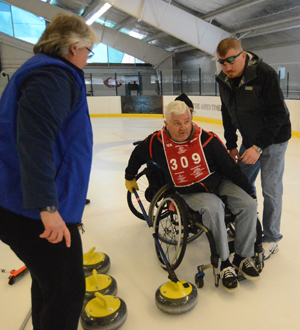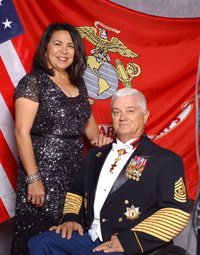First amputee to serve in Iraq continues to break barriers through adaptive sports
 In 1993, William “Bud” McLeroy was excelling in two very physical career fields—as a firefighter and infantryman in the Army Reserve. The San Diego native and father of four had just purchased a home. Life was going according to plan—until a vehicle collision at home nearly severed his leg.
In 1993, William “Bud” McLeroy was excelling in two very physical career fields—as a firefighter and infantryman in the Army Reserve. The San Diego native and father of four had just purchased a home. Life was going according to plan—until a vehicle collision at home nearly severed his leg.
McLeroy stayed conscious during the accident and assisted with his own tourniquet. But due to the severity of the injury, he ultimately made the decision to have the leg amputated. He knew it was his best shot for staying in the military and keeping his job as a firefighter.
“When I lost my leg, I had family that wanted me to go on disability and told me that I’d be taken care of,” said McLeroy, who still wanted to work and stay as active as possible. “I said no, I won’t give up. I have to be an example for my kids.
“I put on my first prosthetic and less than two months later was cleared for both the fire department and the Army. It made me the first professional one-legged firefighter. And I was still infantry, but I was doing it with one leg.”
McLeroy was committed to challenging himself. He went through the U.S. Army’s Special Operations Center of Excellence grueling psychological course and passed.
“I wanted to do more, continue to prove myself,” explained McLeroy.
That chance came in 2003 when he was activated for deployment, making him the first amputee to serve in Iraq.
“I took a few spare legs with me. If someone else hurt their leg, they would have to go to the hospital. I would just replace mine,” explained McLeroy, matter-of-factly.
Six months into McLeroy’s tour, he was wounded in a firefight. At the time, he was carrying Iraqi civilians to safety. The force of a blast ruptured his stomach causing severe internal damage.
Additionally, McLeroy suffered an injury to his back that left him in extreme pain. Though he received an MRI after the injury, he was told nothing indicated there would be considerable residual effects. Years later, doctors would discover the injury was far worse than anyone could have known.
“I first noticed my internal organs started having problems. I thought ‘Jeez, getting old really sucks,’” said McLeroy. “Then I started tripping a lot. Slowly everything got worse.”
He went to the doctor and received another MRI. McLeroy was told he would need to go see a neurosurgeon the next day.
“The doctor told me that I needed surgery and that there was damage to my spinal cord,” said McLeroy.
McLeroy was shocked to learn his initial scans didn’t catch how serious the injury was.
“My spinal cord had swollen and had been killing nerve roots,” said McLeroy. “[The doctor] said, ‘You’re slowly becoming a paraplegic.’”
 He spent 18 months in recovery after his surgery, and, after a nearly 33-year career, retired as a command sergeant major.
He spent 18 months in recovery after his surgery, and, after a nearly 33-year career, retired as a command sergeant major.
“I wanted to stay in the military longer but had to retire from the Army along with the fire department. Now I’m in a wheelchair.”
Now for a second time in his life, McLeroy was facing a life-changing injury.
“It was kind of like being a race car driver,” explained McLeroy. “You’re going 200 miles an hour and suddenly someone says you can only go 20 and you don’t know what to do anymore.”
McLeroy again refused to follow a speed limit posted by others. Adaptive sports put him back in the fast lane.
For a third year, McLeroy is traveling to Snowmass, Colo., to take part in the DAV and VA co-hosted National Disabled Veterans Winter Sports Clinic.
“It is an awesome event,” said McLeroy. “Adaptive sports gives us purpose, and that is important. It gets us out of that rut, allowing us to associate with veterans and friends again.”
McLeroy says that for people with recent spinal cord injuries, it can be difficult to get active again.
“Events like the Winter Sports Clinic prevent you from going down that rabbit hole of feeling stuck in your house,” explained McLeroy. He added that when surrounded by hundreds of other disabled veterans “you feel at home.”
He encourages other veterans to get involved in adaptive sports through events like the National Disabled Veterans Winter Sports Clinic and is committed to helping his fellow disabled veterans lead active lives.
“When people think they can’t do something, I say don’t let others put limitations on you,” he said. “When I first went to the Winter Sports Clinic in 2016, I had never used a sit ski before, and just two months ago [I was] going off jumps with 5 feet of air! That wouldn’t have happened if I didn’t go to the clinic. It allowed me to seek freedom.”
In addition to improving on the mountain, McLeroy wants to focus on curling at this year’s clinic. He stresses the importance of setting goals and not listening to the people that tell you that you can’t accomplish them.
“I wound up on a skydiving team after I lost my leg and people said I couldn’t, and I said I already did,” said McLeroy. “People couldn’t believe I was a firefighter with one leg, either. Well, I’m doing it. If you want it bad enough, it is there for the taking.
“There is life after limb loss, illness or injury,” he added. “The only limits are what you put on yourself.”
About the event: Co-hosted by DAV and the U.S. Department of Veterans Affairs, the National Disabled Veterans Winter Sports Clinic promotes sports therapy and rehabilitation through adaptive Alpine and Nordic skiing, rock climbing, wheelchair self-defense, sled hockey, scuba diving and other adaptive sports and activities. The five day event in Snowmass, Colorado is a world leader in adaptive winter sports instruction for ill and injured Veterans and their families. Be inspired at wintersportsclinic.org






